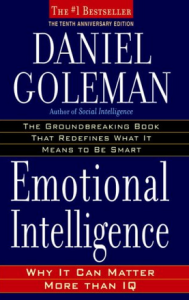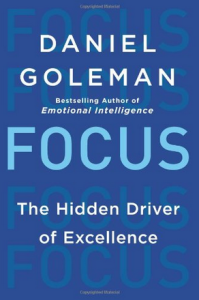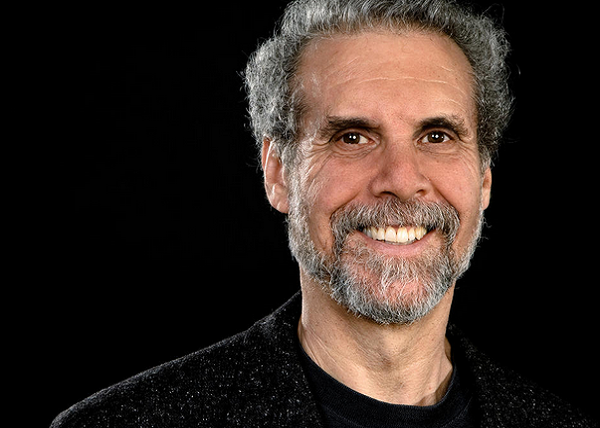Our Mindful Man of the Month for July is Daniel Goleman. Mr. Goleman’s work on emotional intelligence has been a driving force in the mindful movement.
Emotional intelligence…the phrase could almost be an oxymoron.
Intelligence is associated with reason and logic. Intelligence is calculated and methodical and is hardly thought of as the catalyst for or the end product of emotion.
Emotion, on the other hand, is primal. It is visceral and intuitive; it occurs spontaneously and without much consideration. Indeed, these two words have no place in the same phrase.
Daniel Goleman would disagree. The renowned psychiatrist and best-selling author defines emotional intelligence as a measure of how well we conduct ourselves in our relationships, and he champions the theory that this should replace traditional “intelligence” as the benchmark for how we evaluate success in life.
According to Goleman, emotional intelligence (or EI) is an aptitude that follows from the mastery of four facets of human thought and expression.
The Facets of Emotional Intelligence
 The first is self-awareness, being conscious of what our feelings are and why we are feeling them. Understanding the nature and origin of our emotions allows us to be intuitive and make good decisions.
The first is self-awareness, being conscious of what our feelings are and why we are feeling them. Understanding the nature and origin of our emotions allows us to be intuitive and make good decisions.
The second is self-management. We must embrace the emotions that serve us well while learning to deal with our less-pleasant feelings in a positive and healthy manner.
The third facet is empathy, which is our ability to feel what others are feeling and our penchant for taking moral and thoughtful action
The fourth dimension is social skill, how adept we are at taking these first three principles and building effective relationships.
His Story
In 1990, Goleman was a science journalist for the New York Times, writing on the brain and behavioral science. At the time, society gauged how successful a human being was destined to be based on how intelligent that person was; so Goleman was intrigued when he stumbled upon an article by the psychologists John Mayer and Peter Salovey that proposed the earliest concept of emotional intelligence.
 He became enthralled by the possibility of reassessing what comprises life success, and this became his motivation for producing his flagship literary work, Emotional Intelligence: Why It Can Matter More Than IQ. The text united a plethora of research projects on the subject that had, until that point, never been considered as parallel explorations on the same topic. It focused a lot of scattered data on the same conversation, analyzed that data, and contributed new findings in affective neuroscience, which investigates the regulation of emotions in the brain.
He became enthralled by the possibility of reassessing what comprises life success, and this became his motivation for producing his flagship literary work, Emotional Intelligence: Why It Can Matter More Than IQ. The text united a plethora of research projects on the subject that had, until that point, never been considered as parallel explorations on the same topic. It focused a lot of scattered data on the same conversation, analyzed that data, and contributed new findings in affective neuroscience, which investigates the regulation of emotions in the brain.
Published in 1995, the book became immensely popular, ranking as a New York Times bestseller for a year and a half.
But before we consider what came of that success, let’s consider addressing the question presented in the book’s title…Why can emotional intelligence matter more than IQ?
Why Emotional Intelligence Matters
An example of why emotional aptitude is a better quantifier of success than intelligence can be heard in a story told to Goleman by one of his relatives. His brother-in-law, Leonard, is a writer, horror aficionado and apparently an enthusiast of all things morbid, because he wrote a book about the Santa Cruz Strangler, a serial killer. Leonard interviewed this man, who murdered eight people, including members of his family, and he reflected on those interactions with Goleman. Leonard found the killer to be a horrifying human being, but what caused Leonard to be so aghast was the man’s intellectual capacity. The Santa Cruz Strangler had an IQ of 160, which meant he was certifiable as a genius as well as a lunatic.
To know that such a profound mind is capable of extinguishing life without remotely good or just reason is not only upsetting but also a hint that emotional intelligence should have more gravity than IQ. Despite his intelligence, the Strangler was clearly not successful in society. He felt no human connection with the people he murdered. He claimed to have been able to ignore that part of his conscience. During a TED Talk that Goleman delivered in 2007, he stressed the significance of feeling what others feel. “It’s our empathy, it’s our tuning in which separates us from Machiavellians or sociopaths.”
It is worth noting that this analogy is not meant to suggest that every antisocial little boy or girl will become a serial killer. What is does imply is that social and emotional capabilities might be the most telling signs of an enlightened human being; therefore, consideration should be given to the development of these skills.
It turns out that the region of the brain that is associated with emotional and social intelligence is the last to reach physical maturity. In other words, there is time to develop this region; and Daniel Goleman believes that by educating our children in the four domains of emotional aptitude, we give them the skill set to become truly evolved human beings.
The popularity of Emotional Intelligence made Goleman a household name, and it led to several more literary successes on related topics; but his greatest sense of pride in his accomplishments comes in the fact that he proliferated a message he believes in. In 1993, before Emotional Intelligence was finished, he co-founded the Collaborative for Academic, Emotional and Social Learning. The mission of this group was to integrate emotional and social learning or SEL into traditional education systems.
Goleman’s literary work and his part in forming the collaborative has been the spark for an entire movement of organizations that developed to promote SEL. Programs have been started worldwide and SEL has become the standard in many school districts and states in the U.S. The concept of SEL has seen application beyond the education of children, spreading to the business world where Goleman is seen as a visionary and even resonating with religious scholars. His teachings on awareness and empathy giving rise to successful and compassionate relationships have inspired many.
Emotional Intelligence Today
Today, 20 years later, enough data has been collected on the efficiency of SEL that measurable amounts of success can be verified. In the tens of thousands of schools that SEL has been introduced to, nearly half of the students have shown markedly better achievement scores and GPA. Statistic on misbehavior and disciplinary action have dropped while percentages of positive behavior and attendance rates have been on the rise.
And yet, the solution to achieving success is not so simple. Despite a greater understanding of what it takes to be emotionally adept, something still prevents people from acting on every opportunity to be a good person. That something happens to be distraction.
Let’s get back to our serial killer for a second. I know it’s the most morbid analogy one can think of, but it’s one of Goleman’s own, and you must admit it is intriguing to discuss sociopaths. When brother-in-law Leonard was interviewing the Santa Cruz Strangler, he felt compelled to ask the man if he experienced any empathy toward his victims. In response to Leonard’s question, the man replied, “Oh no. If I’d felt the distress, I could not have done it. I had to turn that part of me off.”
It is Daniel Goleman’s contention that when we have a moral compass to follow and we do not follow it, we are doing exactly that, turning ourselves off to feeling what others are feeling. The difference is we do it in a much less intentional and callous way. We become self-absorbed in our lives, in our careers, in our personal daily progress.
Goleman’s work on Focus
Goleman’s most recent book, Focus: The Hidden Driver of Excellence, is a testament to how people fail to be compassionate when their attention is distracted. What’s worse, is that our dependence on technology compounds are penchant for constantly focusing inward.
 In an excerpt from Focus that was published in the December 2013 issue of Mindful, Goleman says, “…indifference…and…silence…are symptoms of how technology captures our attention and disrupts our connections. Today it’s the norm.”
In an excerpt from Focus that was published in the December 2013 issue of Mindful, Goleman says, “…indifference…and…silence…are symptoms of how technology captures our attention and disrupts our connections. Today it’s the norm.”
The book gives examples of how people lost in the own world can ignore others in need. One anecdote sites the tendency of hustling city dwellers to step over and around a man laying prone in a subway terminal. Goleman maintains that most are not willfully denying the man help. Rather, they only see him in their periphery because they are focused on their smart phones and the urgency of their schedules. Therefore, they do not recognize an authentic connection and an opportunity to be compassionate.
Focus examines the many types of attention and awareness; and it promotes several practices that are recommended for sharpening our ability to be conscious of others. Mindfulness meditation, it should be no surprise, is perhaps the most important tool in heightening awareness and balancing inward and outward focus. Memorization and sustained concentration are suggested in addition to meditation in strengthening what Goleman calls the “muscle of our attention.”
The text offers a wealth of empirical evidence that these tools are significant in helping us evolve, but the message itself is simple: we need to improve our ability to resist distraction and tune into the authentic connections that happen every moment between human beings. We need to look away from the screens and be good to one another.
[Image: via Google Images, and Stephen Lark on flickr]











